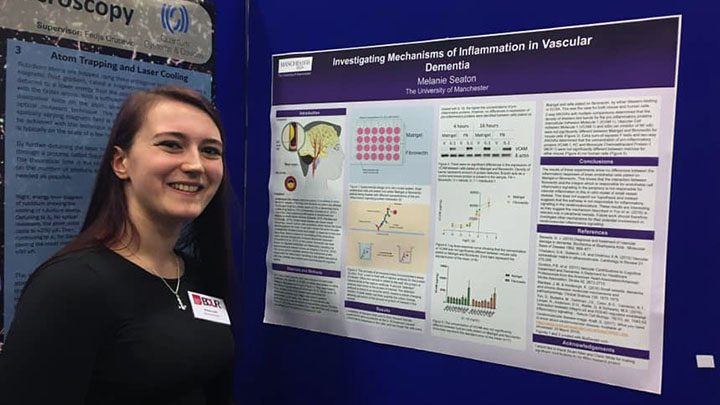Put theory into practice.
Get research experience and work towards a master’s qualification by undertaking a research project in your final year of this four-year programme.
This project will provide you with significant research experience, which will be invaluable if you decide to apply for a PhD and enter a career in research.
Eligibility
Opting for an MSci course
You can apply directly for the MSci or swap onto an MSci from the majority of our BSc courses.

Entry requirements
Entry requirements for the BSc and MSci courses are the same and the first two years of the MSci are identical to the equivalent BSc course.

Continuation
Continuation onto the MSci course is dependent on certain academic criteria and will be subject to a cap on the number of students.

From our students
Melanie Seaton
MSci Pharmacology graduate Melanie looks back on her integrated master’s course.
Read the blog : Looking back at my MSci and forward to my PhD.

Oliver Scott
Oliver reveals why he chose to study for an MSci in Neuroscience.
Read the blog : Why I chose to study MSci Neuroscience at Manchester

Aleina Alex
MSci Neuroscience student Aleina shares her academic journey.
Read the blog : Pursuing an integrated master’s in Neuroscience.

Projects
A variety of options.
There are more than 200 research labs at the University in which you could potentially undertake your project, with research areas ranging from stem cell science to frog conservation biology.
Specialist research projects in the field or in history of science may also be available for specific courses.
Fees and funding
Do you pay extra to study an MSci course?
The fees for the MSci year will be the same as the annual fees for the BSc courses. Please refer to individual course entries for more information.
MSci courses can be funded through a student loan in the same way as standard undergraduate degrees (for home students), so they are a great way to fund a master’s qualification.
In comparison, if you apply for a master’s after completing an undergraduate course, you wouldn’t receive the same level of financial support from the government for your postgraduate study.
Courses
Degrees offering an integrated master's year.
Explore some of the courses offering an integrated master's year.
The below links will take you to the relevant MSci course page (2026 entry) on The University of Manchester website.
Course content
What will my course look like?
You will take the same lecture and practical units as the three-year BSc students in Year 1 and 2.
In Year 3, you will take the two degree programme-specific papers (problem and essay papers) and five lecture units. You will be prepared for the degree programme-specific papers through the third year tutorials with the BSc students.
The remaining 50 credits will come from the following units:
- MSci Research Project Proposal (10 credits)
- MSci Experimental Skills Module (20 credits)
To progress to the third year of the MSci, you must obtain a minimum average of 60% during the first two years of your study (with no fails in mandatory units during the first year, and no fails in any units during the second year).
Explore more study options
Explore more study options
Alternatives to consider.
You can choose from a range of study options when you study biosciences at The University of Manchester.
